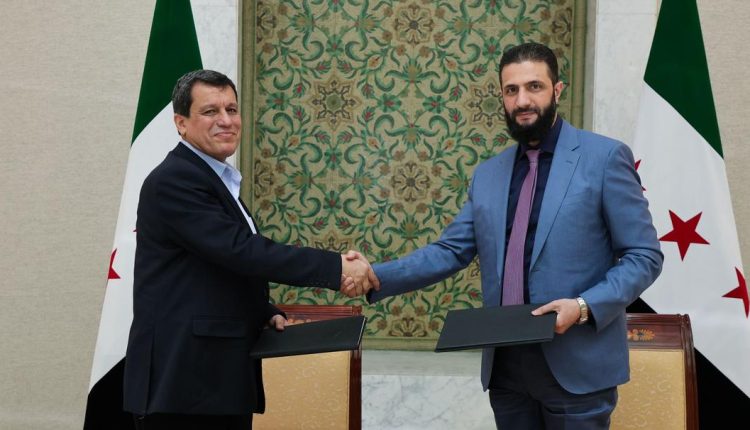Syrian Government and Kurds Discuss Implementation of Prior Agreement
By Kardo Roj
QAMISHLI, Syria (North Press) – A delegation from the Syrian government held a high-level meeting with the Syrian Democratic Forces (SDF) at the Conoco gas field in Deir ez-Zor countryside on Monday, as part of ongoing efforts to implement the agreement signed between Syrian President Ahmad al-Shar’a and SDF Commander General Mazloum Abdi, a military source told North Press.
The meeting marks a new phase in the evolving relationship between Damascus and the Autonomous Administration of North and East Syria (AANES), as both parties seek mechanisms to reduce tensions and ensure functional cooperation across contested territories.
According to the source, who requested anonymity due to the sensitivity of the discussions, the delegation emphasized the need to uphold the “Tishrin Dam Agreement”—a key clause of the broader accord between the two leaderships—by maintaining the dam under civilian management and fully removing it from the military conflict equation.
The source also revealed that both regional and international actors have played active roles in facilitating continued dialogue between Damascus and Qamishli, especially in the aftermath of recent tensions.
While the source did not name specific countries involved, the involvement of mediating parties underscores the geopolitical significance of the Shar’a-Abdi pact, which aims to forge channels of cooperation without undermining the autonomy currently exercised by AANES in northeast Syria.
This initiative follows several months of escalated clashes around the Tishrin Dam, which witnessed sustained hostilities between SDF forces and Turkish-backed Syrian National Army (SNA) factions.
Strategic Importance of the Tishrin Dam
Located along the Euphrates River, the Tishrin Dam is not only a vital source of electricity and water for large parts of northern Syria but also a strategic asset situated at the crossroads of influence between competing powers.
Under the agreement, both Damascus and the SDF have committed to maintaining the dam’s civilian status, thereby insulating it from direct military confrontations. This clause was reportedly reaffirmed during Monday’s meeting, where the delegation expressed mutual interest in preserving critical infrastructure and preventing further disruption to essential public services.
The agreement seeks to build confidence and establish joint frameworks for technical cooperation without altering the existing governance structure or territorial control—a delicate balance that appears to remain intact for now.
Clarification on Military Sites
Responding to circulating reports that suggested the imminent handover of the al-Omar and Conoco bases to Syrian government forces, the source firmly denied any such arrangement.
“The discussions were exclusively focused on implementing the signed terms of the Shar’a-Abdi agreement, particularly the protection of infrastructure like Tishrin Dam,” the source said, dismissing rumors of military transfers or administrative changes in the two key installations in Deir ez-Zor.
Both bases remain under the operational control of the SDF, with advisory support from the US-led Global Coalition to Defeat ISIS.
Future of Damascus-Qamishli Dialogue
This renewed engagement signals a tentative but noteworthy shift in the broader dynamics between the Syrian government and the AANES. Though deeply complex, the Shar’a-Abdi agreement has opened new avenues for coordination in areas where mutual interests—particularly around service delivery and infrastructure stability—overlap.
Observers view the dialogue as part of a pragmatic recalibration amid shifting regional pressures, as both Damascus and the AANES seek to assert their positions in a fragmented and fluid Syrian landscape.
The outcome of these talks could have far-reaching implications for regional stability and the evolving political order in Syria, where decentralization and local governance models continue to play an increasingly prominent role.

